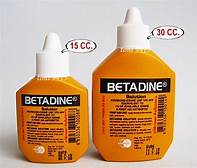Betadine: Difference between revisions
No edit summary |
m (Text replacement - "{{microfooter" to "{{ufooter") Tag: Manual revert |
||
| (5 intermediate revisions by the same user not shown) | |||
| Line 1: | Line 1: | ||
{{header}} | {{header}} | ||
[[File:Betadine.jpg|thumb|Commercially available Betadine]] | [[File:Betadine.jpg|thumb|Commercially available Betadine]] | ||
'''Povidone-iodine''' (PVP-I), also known as iodopovidone, is an antiseptic used for skin disinfection before and after surgery. It may be used both to disinfect the skin of the patient and the hands of the healthcare providers. It may also be used for minor wounds. It may be applied to the skin as a liquid or a powder. | '''Povidone-iodine''' (PVP-I), also known as iodopovidone, is an antiseptic used for skin disinfection before and after surgery. It is sold under a number of brand names including '''Betadine'''. It may be used both to disinfect the skin of the patient and the hands of the healthcare providers. It may also be used for minor wounds. It may be applied to the skin as a liquid or a powder. | ||
Side effects include skin irritation. If used on large wounds, kidney problems, high blood sodium, and metabolic acidosis may occur. It is not recommended in people who are less than 32 weeks pregnant or are taking lithium. Frequent use is not recommended in people with thyroid problems. Povidone-iodine is a chemical complex of povidone, hydrogen iodide, and elemental iodine. It contains from 9% to 12% available iodine. It works by releasing iodine which results in the death of a range of microorganisms. | Side effects include skin irritation. If used on large wounds, kidney problems, high blood sodium, and metabolic acidosis may occur. It is not recommended in people who are less than 32 weeks pregnant or are taking lithium. Frequent use is not recommended in people with thyroid problems. Povidone-iodine is a chemical complex of povidone, hydrogen iodide, and elemental iodine. It contains from 9% to 12% available iodine. It works by releasing iodine which results in the death of a range of microorganisms. | ||
Povidone-iodine came into commercial use in 1955. It is on the World Health Organization's List of Essential Medicines, the most effective and safe medicines needed in a health system. Povidone-iodine is available over the counter. The wholesale cost in the developing world is about US$3.30 to US$11.40 per liter of 10% solution. | Povidone-iodine came into commercial use in 1955. It is on the World Health Organization's List of Essential Medicines, the most effective and safe medicines needed in a health system. Povidone-iodine is available over the counter. The wholesale cost in the developing world is about US$3.30 to US$11.40 per liter of 10% solution. | ||
{{ufooter}} | {{ufooter}} | ||
Latest revision as of 08:23, 24 November 2021
Povidone-iodine (PVP-I), also known as iodopovidone, is an antiseptic used for skin disinfection before and after surgery. It is sold under a number of brand names including Betadine. It may be used both to disinfect the skin of the patient and the hands of the healthcare providers. It may also be used for minor wounds. It may be applied to the skin as a liquid or a powder.
Side effects include skin irritation. If used on large wounds, kidney problems, high blood sodium, and metabolic acidosis may occur. It is not recommended in people who are less than 32 weeks pregnant or are taking lithium. Frequent use is not recommended in people with thyroid problems. Povidone-iodine is a chemical complex of povidone, hydrogen iodide, and elemental iodine. It contains from 9% to 12% available iodine. It works by releasing iodine which results in the death of a range of microorganisms.
Povidone-iodine came into commercial use in 1955. It is on the World Health Organization's List of Essential Medicines, the most effective and safe medicines needed in a health system. Povidone-iodine is available over the counter. The wholesale cost in the developing world is about US$3.30 to US$11.40 per liter of 10% solution.
What links here • References and Sources • Contact info
